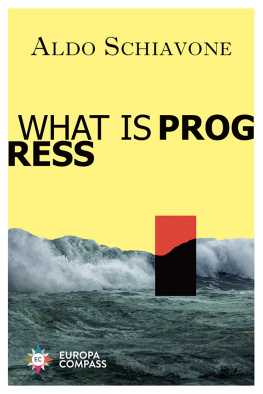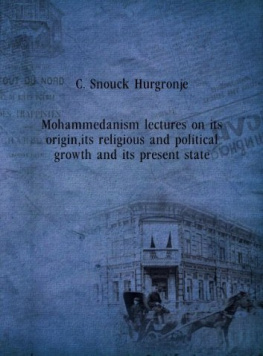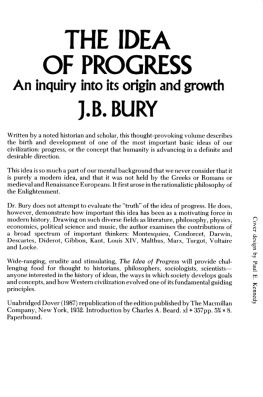J. B. Bury - The Idea of Progress / An inguiry into its origin and growth
Here you can read online J. B. Bury - The Idea of Progress / An inguiry into its origin and growth full text of the book (entire story) in english for free. Download pdf and epub, get meaning, cover and reviews about this ebook. year: 2010, genre: Science. Description of the work, (preface) as well as reviews are available. Best literature library LitArk.com created for fans of good reading and offers a wide selection of genres:
Romance novel
Science fiction
Adventure
Detective
Science
History
Home and family
Prose
Art
Politics
Computer
Non-fiction
Religion
Business
Children
Humor
Choose a favorite category and find really read worthwhile books. Enjoy immersion in the world of imagination, feel the emotions of the characters or learn something new for yourself, make an fascinating discovery.
The Idea of Progress / An inguiry into its origin and growth: summary, description and annotation
We offer to read an annotation, description, summary or preface (depends on what the author of the book "The Idea of Progress / An inguiry into its origin and growth" wrote himself). If you haven't found the necessary information about the book — write in the comments, we will try to find it.
J. B. Bury: author's other books
Who wrote The Idea of Progress / An inguiry into its origin and growth? Find out the surname, the name of the author of the book and a list of all author's works by series.
The Idea of Progress / An inguiry into its origin and growth — read online for free the complete book (whole text) full work
Below is the text of the book, divided by pages. System saving the place of the last page read, allows you to conveniently read the book "The Idea of Progress / An inguiry into its origin and growth" online for free, without having to search again every time where you left off. Put a bookmark, and you can go to the page where you finished reading at any time.
Font size:
Interval:
Bookmark:
The Project Gutenberg EBook of The Idea of Progress, by J. B. Bury
This eBook is for the use of anyone anywhere at no cost and with
almost no restrictions whatsoever. You may copy it, give it away or
re-use it under the terms of the Project Gutenberg License included
with this eBook or online at www.gutenberg.org
Title: The Idea of Progress
An Inquiry Into Its Origin And Growth
Author: J. B. Bury
Release Date: January 5, 2010 [EBook #4557]
Language: English
*** START OF THIS PROJECT GUTENBERG EBOOK THE IDEA OF PROGRESS ***
Produced by Steve Harris, Charles Franks, David Widger and the Online
Distributed Proofreading Team
And Fellow Of King's College, In The University Of Cambridge
Marie Jean Antoine Nicolas Caritat de Condorcet, Auguste Comte, Herbert
Spencer, and other optimists mentioned in this volume.
We may believe in the doctrine of Progress or we may not, but in either case it is a matter of interest to examine the origins and trace the history of what is now, even should it ultimately prove to be no more than an idolum saeculi, the animating and controlling idea of western civilisation. For the earthly Progress of humanity is the general test to which social aims and theories are submitted as a matter of course. The phrase CIVILISATION AND PROGRESS has become stereotyped, and illustrates how we have come to judge a civilisation good or bad according as it is or is not progressive. The ideals of liberty and democracy, which have their own ancient and independent justifications, have sought a new strength by attaching themselves to Progress. The conjunctions of "liberty and progress," "democracy and progress," meet us at every turn. Socialism, at an early stage of its modern development, sought the same aid. The friends of Mars, who cannot bear the prospect of perpetual peace, maintain that war is an indispensable instrument of Progress. It is in the name of Progress that the doctrinaires who established the present reign of terror in Russia profess to act. All this shows the prevalent feeling that a social or political theory or programme is hardly tenable if it cannot claim that it harmonises with this controlling idea.
In the Middle Ages Europeans followed a different guiding star. The idea of a life beyond the grave was in control, and the great things of this life were conducted with reference to the next. When men's deepest feelings reacted more steadily and powerfully to the idea of saving their souls than to any other, harmony with this idea was the test by which the opportuneness of social theories and institutions was judged. Monasticism, for instance, throve under its aegis, while liberty of conscience had no chance. With a new idea in control, this has been reversed. Religious freedom has thriven under the aegis of Progress; monasticism can make no appeal to it.
For the hope of an ultimate happy state on this planet to be enjoyed by future generationsor of some state, at least, that may relatively be considered happyhas replaced, as a social power, the hope of felicity in another world. Belief in personal immortality is still very widely entertained, but may we not fairly say that it has ceased to be a central and guiding idea of collective life, a criterion by which social values are measured? Many people do not believe in it; many more regard it as so uncertain that they could not reasonably permit it to affect their lives or opinions. Those who believe in it are doubtless the majority, but belief has many degrees; and one can hardly be wrong in saying that, as a general rule, this belief does not possess the imaginations of those who hold it, that their emotions react to it feebly, that it is felt to be remote and unreal, and has comparatively seldom a more direct influence on conduct than the abstract arguments to be found in treatises on morals.
Under the control of the idea of Progress the ethical code recognised in the Western world has been reformed in modern times by a new principle of far-reaching importance which has emanated from that idea. When Isocrates formulated the rule of life, "Do unto others," he probably did not mean to include among "others" slaves or savages. The Stoics and the Christians extended its application to the whole of living humanity. But in late years the rule has received a vastly greater extension by the inclusion of the unborn generations of the future. This principle of duty to posterity is a direct corollary of the idea of Progress. In the recent war that idea, involving the moral obligation of making sacrifices for the sake of future ages, was constantly appealed to; just as in the Crusades, the most characteristic wars of our medieval ancestors, the idea of human destinies then in the ascendant lured thousands to hardship and death.
The present attempt to trace the genesis and growth of the idea in broad outline is a purely historical inquiry, and any discussion of the great issue which is involved lies outside its modest scope. Occasional criticisms on particular forms which the creed of Progress assumed, or on arguments which were used to support it, are not intended as a judgment on its general validity. I may, however, make two observations here. The doubts which Mr. Balfour expressed nearly thirty years ago, in an Address delivered at Glasgow, have not, so far as I know, been answered. And it is probable that many people, to whom six years ago the notion of a sudden decline or break-up of our western civilisation, as a result not of cosmic forces but of its own development, would have appeared almost fantastic, will feel much less confident to-day, notwithstanding the fact that the leading nations of the world have instituted a league of peoples for the prevention of war, the measure to which so many high priests of Progress have looked forward as meaning a long stride forward on the road to Utopia.
The preponderance of France's part in developing the idea is an outstanding feature of its history. France, who, like ancient Greece, has always been a nursing-mother of ideas, bears the principal responsibility for its growth; and if it is French thought that will persistently claim our attention, this is not due to an arbitrary preference on my part or to neglect of speculation in other countries.
J. B. BURY. January, 1920.
INTRODUCTION
| CHAPTER I. | SOME INTERPRETATIONS OF UNIVERSAL HISTORY: BODIN AND LE ROY |
| CHAPTER II. | UTILITY THE END OF KNOWLEDGE: BACON |
| CHAPTER III. | CARTESIANISM |
| CHAPTER IV. | THE DOCTRINE OF DEGENERATION: THE ANCIENTS AND MODERNS |
| CHAPTER V. | THE PROGRESS OF KNOWLEDGE: FONTENELLE |
| CHAPTER VI. | THE GENERAL PROGRESS OF MAN: ABBE DE SAINT-PIERRE |
| CHAPTER VII. | NEW CONCEPTIONS OF HISTORY: MONTESQUIEU, VOLTAIRE, TURGOT |
| CHAPTER VIII. | THE ENCYCLOPAEDISTS AND ECONOMISTS |
| CHAPTER IX. | WAS CIVILISATION A MISTAKE? ROUSSEAU, CHASTELLUX |
| CHAPTER X. | THE YEAR 2440 |
| CHAPTER XI. | THE FRENCH REVOLUTION: CONDORCET |
| CHAPTER XII. | THE THEORY OF PROGRESS IN ENGLAND |
| CHAPTER XIII. | GERMAN SPECULATIONS ON PROGRESS |
| CHAPTER XIV. | CURRENTS OF THOUGHT IN FRANCE AFTER THE REVOLUTION |
| CHAPTER XV. | THE SEARCH FOR A LAW OF PROGRESS: |
Font size:
Interval:
Bookmark:
Similar books «The Idea of Progress / An inguiry into its origin and growth»
Look at similar books to The Idea of Progress / An inguiry into its origin and growth. We have selected literature similar in name and meaning in the hope of providing readers with more options to find new, interesting, not yet read works.
Discussion, reviews of the book The Idea of Progress / An inguiry into its origin and growth and just readers' own opinions. Leave your comments, write what you think about the work, its meaning or the main characters. Specify what exactly you liked and what you didn't like, and why you think so.













